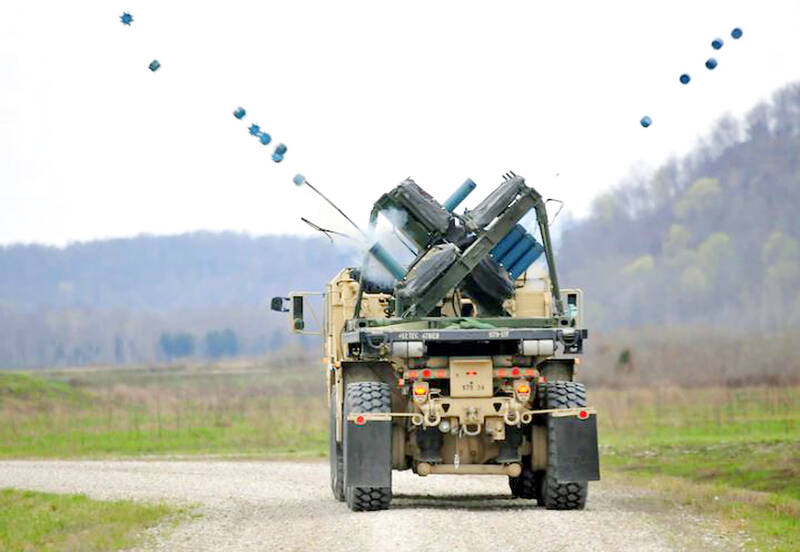Army Command Headquarters yesterday said that only anti-tank munitions would be included in a proposed purchase of US Volcano mine-dispensing systems, and the deal does not breach international laws banning anti-personnel mines.
The statement came after independent Legislator May Chin (高金素梅) expressed concern that the proposed purchase risked creating a “landmine hell” similar to that experienced by post-war Cambodia.
The metal-cased anti-vehicle mines could not be accidentally triggered by people stepping on them, and such munitions would only be deployed in the event of war, the army said in a statement.

Photo: Screen grab from the US Army Reserve Web site
It also said that a purchase of the Volcano systems would not breach local and international laws prohibiting the acquisition and use of anti-personnel mines.
The US Army in the 1980s developed the M136 Volcano automated mine delivery system, which can be mounted on ground vehicles or helicopters.
Called a Ground Volcano when fitted to land-based vehicles, it uses prepackaged mine canisters that contain multiple anti-personnel or anti-tank mines that can be placed across a vast area.
The main advantage of the system to Taiwan is its ability to rapidly deploy anti-tank mines to ward off an amphibious landing, the army said, adding that it has been considering such a purchase since 2018.
The proposed US$180 million deal — approved by the US Department of State on Dec. 28 last year — includes vehicle-launched Volcano anti-tank munition-laying systems and M977A4 HEMTT 10-tonne cargo trucks on which the system would be mounted, the Ministry of National Defense said in a statement.
The sale is likely to be confirmed by the US Congress within the next month, it added.
Su Tzu-yun (蘇紫雲), a research fellow at the government-funded Institute for National Defense and Security Research, dismissed concerns that the arms deal would contravene the UN Ottawa Treaty, given that it bans the use of anti-personnel landmines only.
Changes made by Washington to the US’ anti-personnel landmine policy places bans on producing and exporting anti-personnel landmines, he added.
Taiwan would only deploy the Volcano anti-tank system to a few beaches on which an amphibious landing could be made, Su said.
The mines themselves are defensive in nature and would delay rather than defeat an enemy advance, he added.

Alain Robert, known as the "French Spider-Man," praised Alex Honnold as exceptionally well-prepared after the US climber completed a free solo ascent of Taipei 101 yesterday. Robert said Honnold's ascent of the 508m-tall skyscraper in just more than one-and-a-half hours without using safety ropes or equipment was a remarkable achievement. "This is my life," he said in an interview conducted in French, adding that he liked the feeling of being "on the edge of danger." The 63-year-old Frenchman climbed Taipei 101 using ropes in December 2004, taking about four hours to reach the top. On a one-to-10 scale of difficulty, Robert said Taipei 101

Nipah virus infection is to be officially listed as a category 5 notifiable infectious disease in Taiwan in March, while clinical treatment guidelines are being formulated, the Centers for Disease Control (CDC) said yesterday. With Nipah infections being reported in other countries and considering its relatively high fatality rate, the centers on Jan. 16 announced that it would be listed as a notifiable infectious disease to bolster the nation’s systematic early warning system and increase public awareness, the CDC said. Bangladesh reported four fatal cases last year in separate districts, with three linked to raw date palm sap consumption, CDC Epidemic Intelligence

Two Taiwanese prosecutors were questioned by Chinese security personnel at their hotel during a trip to China’s Henan Province this month, the Mainland Affairs Council (MAC) said yesterday. The officers had personal information on the prosecutors, including “when they were assigned to their posts, their work locations and job titles,” MAC Deputy Minister and spokesman Liang Wen-chieh (梁文傑) said. On top of asking about their agencies and positions, the officers also questioned the prosecutors about the Cross-Strait Joint Crime-Fighting and Judicial Mutual Assistance Agreement, a pact that serves as the framework for Taiwan-China cooperation on combating crime and providing judicial assistance, Liang

US climber Alex Honnold left Taiwan this morning a day after completing a free-solo ascent of Taipei 101, a feat that drew cheers from onlookers and gained widespread international attention. Honnold yesterday scaled the 101-story skyscraper without a rope or safety harness. The climb — the highest urban free-solo ascent ever attempted — took just more than 90 minutes and was streamed live on Netflix. It was covered by major international news outlets including CNN, the New York Times, the Guardian and the Wall Street Journal. As Honnold prepared to leave Taiwan today, he attracted a crowd when he and his wife, Sanni,